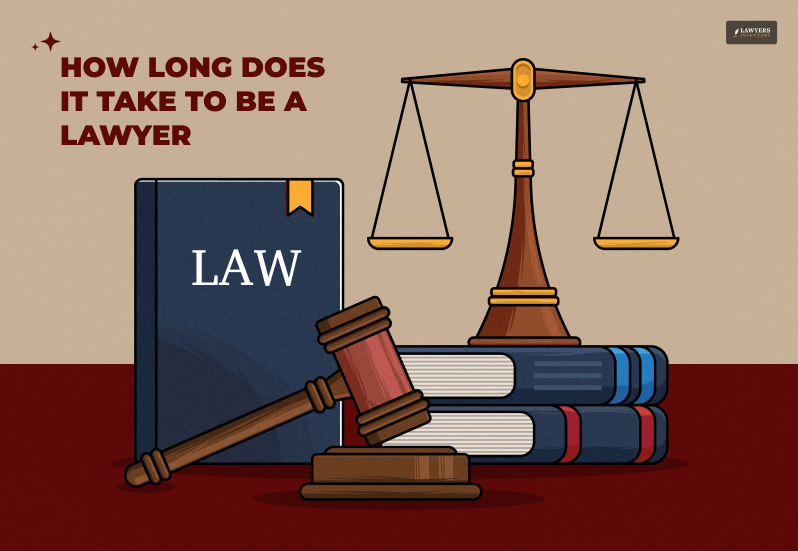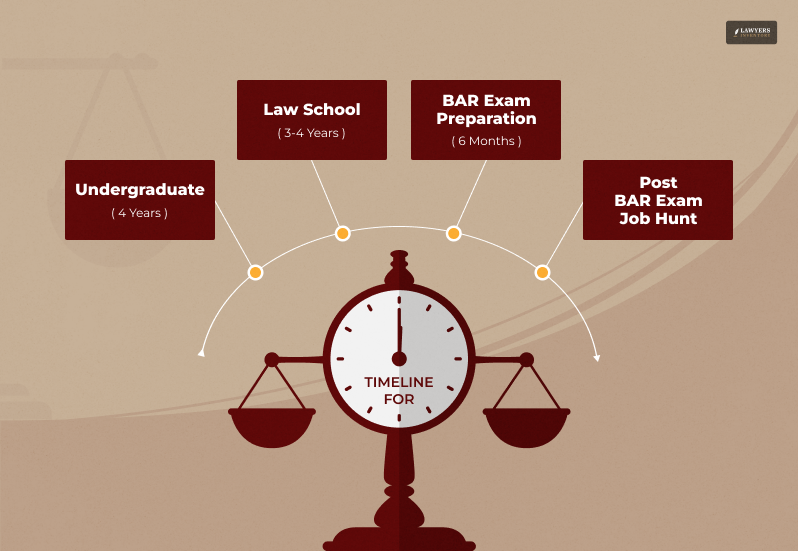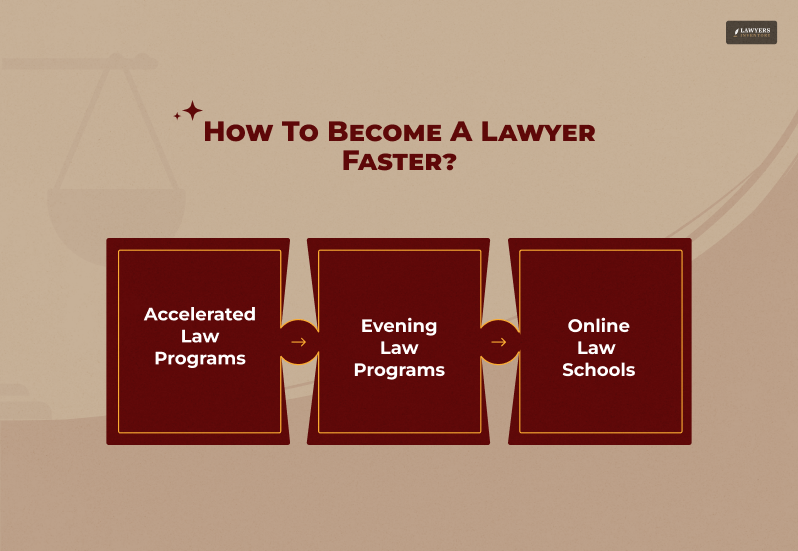
How long does it take to be a lawyer? You are not the only aspirant who has been Googling queries like these!
Tired of shelling out astronomical fees for law school? Feeling trapped in a cycle of debt just to chase your legal dreams? Listen up, I have news for you: it doesn’t have to be that way.
In this article, I will rip the lid off the legal education system and show you how to become a lawyer without breaking the bank. Together, we will explore alternative paths, hidden gems, and insider tips that can save you thousands, if not tens of thousands, of dollars.
So, if you’re ready to ditch the debt and start practicing law on your terms, keep reading. ‘Cause I am about to show you how it’s done.
How Long Does It Take to Become a Lawyer?

Okay, so let me tell you the brutal truth: becoming a lawyer is no walk in the park. It’s a grueling journey that demands years of hard work, endless studying, and a thick skin.
First, you’ll need to slog through a four-year undergraduate degree. Think of it as a warm-up before the real challenge begins. Then, brace yourself for the grueling three years of law school. Therefore, expect to spend countless hours poring over textbooks, cramming for exams, and pulling all-nighters.
Once you’ve survived law school, the real test begins: the bar exam. This beast of a test is notorious for its difficulty and low pass rates. Prepare to sweat it out and pray that you pass. If you want to be in the legal industry and not face the bar exam, maybe becoming a paralegal is something that you can do!
However, even if you pass the bar exam, the legal profession is still a cutthroat jungle. Competition is fierce, and landing a decent job can be a challenge. Therefore, you’ll need to build a strong network, hustle for clients, and be prepared to work long hours for little pay.
Traditional Law School and its Cost Breakdown
Are you ready for a reality check? Traditional law schools are notorious for their sky-high tuition fees. Think of it as a financial black hole that sucks up your life savings and leaves you drowning in debt.
Let’s break down the costs and see how deep this rabbit hole goes.
Tuition Fees
First and foremost, let’s talk about the elephant in the room: tuition fees. It is more like a hefty price tag attached to your dream of becoming a lawyer.
The average annual tuition for law schools in the United States can range from tens to hundreds of thousands of dollars.
And that’s just for one year! Multiply that by three years (the typical length of a law degree), and you’re looking at a staggering amount of debt.
Living Expenses are the Hidden Costs
Secondly, tuition fees are just the beginning. Besides, you’ll also need to factor in living expenses. This includes rent, food, utilities, transportation, and other everyday costs.
Additionally, depending on the city where your law school is located, these expenses can be significantly higher than in smaller towns or rural areas.
Books and Materials
Third, law school textbooks are notorious for being expensive and often outdated. So, you must prepare to spend significant money on textbooks, casebooks, and other essential materials. Furthermore, don’t forget about the cost of printing and photocopying assignments.
Exam Fees
Once you’ve completed your coursework, you must take the bar exam. This final hurdle comes with its own set of fees. Additionally, while the exact cost varies by state, you can expect to pay substantially to sit for the exam.
The Student Loan Debt is a Trap
After graduating from law school, many students are saddled with massive student loan debt. This debt can significantly impact your financial future, making it difficult to buy a home, start a family, or pursue other life goals.
Alternative Pathways to Law School

Firstly, Accelerated law programs offer a more condensed path to a law degree. These programs typically last less than three years, allowing you to graduate sooner and start earning a salary faster.
Furthermore, while they can be intense, accelerated programs can be a great option for those who want to minimize their time and financial investment in legal education.
Secondly, if you’re already working full-time, evening law programs offer a flexible way to pursue your legal career without quitting.
Furthermore, while it may require a lot of time management and dedication, evening law programs can allow you to earn a law degree without sacrificing your current income.
Thirdly, online law schools have become increasingly popular in recent years. These programs offer the flexibility of studying at your own pace and from anywhere with an internet connection.
Although online learning may have some drawbacks, such as limited face-to-face interaction with professors and classmates, these can be cost-effective for many students.
Scholarships and Financial Aid
If you feel like your legal dreams are out of reach because of the exorbitant cost of law school, fear not! Because there are plenty of scholarships and financial aid opportunities available to help you fund your legal education.
The Scholarship
Firstly, scholarships are a fantastic way to reduce the cost of law school. Scholarships are available for students from all backgrounds based on academic achievement, financial need, diversity, and specific areas of legal interest.
This is how you can find scholarships:
- Online Scholarship Databases: Websites like Scholarships.com, Fastweb, and Cappex offer extensive scholarship databases.
- Law School Websites: Many law schools have their scholarship programs. Check the financial aid section of their websites for more information.
- Professional Organizations: Legal associations and professional organizations often offer scholarships to their members or students pursuing specific fields of law.
- Government Grants: Explore government grants and programs that can help you finance your legal education.
Tips for Applying for Scholarships:
- Start Early: Begin your scholarship search before the application deadlines.
- Read the Instructions Carefully: Closely follow each scholarship’s eligibility criteria and application requirements.
- Craft a Strong Essay: Many scholarships require you to submit an essay. Make sure your essay is well-written, compelling, and highlights your qualifications.
- Follow-Up: After submitting your applications, follow up with the scholarship committees to express your interest and inquire about the status of your application.
Financial Aid
In addition to scholarships, financial aid can be a valuable resource for law school students. Furthermore, financial aid typically comes from loans, grants, and work-study programs.
Types of Financial Aid:
- Federal Student Loans: These loans are offered by the federal government and often come with lower interest rates than private loans.
- Grants: These are forms of financial aid that need not be repaid. They are typically awarded based on financial need.
- Work-Study Programs: These programs allow students to earn money by working part-time on-campus jobs.
How to Apply for Financial Aid:
- Fill Out the FAFSA: The Free Application for Federal Student Aid (FAFSA) is the primary application for federal student aid. You can fill out the FAFSA online.
- Contact Your Law School’s Financial Aid Office: Your law school’s financial aid office can provide information about additional financial aid opportunities and help you complete the FAFSA.
Networking and Building Relationships
Tired of feeling like a lone wolf in the legal world? It’s time to step out of your comfort zone and start building relationships.
Networking is a powerful tool that can open doors, land job opportunities, and provide valuable mentorship.
A strong network can lead to job referrals and insider information about upcoming positions. Additionally, mentors can offer guidance, advice, and support as you navigate your legal career. Networking can also help you stay up-to-date on industry trends and developments.
To build relationships, attend legal events, join professional organizations, volunteer for legal organizations, and follow up after meeting new people.
Remember, building relationships takes time and effort. Be genuine, proactive, and willing to give back to the legal community. After all, with a strong network, you’ll be well on your way to a successful legal career.
Don’t Let the Cost Hold You Back
Alternative legal pathways can be the best option if you want to know how long it takes to become a lawyer without going bankrupt.
Some alternatives can assist you in achieving your legal goals while lowering your financial load, whether you choose an online, evening, or expedited program for your legal education.
The cost of law school can be considerably decreased with a bit of work and investigation to discover financial help and scholarships.
Don’t let the hefty price tag stop you from achieving your goals in law. There are plenty of opportunities out there to help you achieve your goals.
Additional Reading:
- Virginia Employment Law: A Guide So That You DON’T Get Fired
- How Long Does a Personal Injury Lawsuit Take: A Guide to Win the Case?
- Georgia Employment Laws and Rules You MUST Know About Before You Go!











0 Reply
No comments yet.